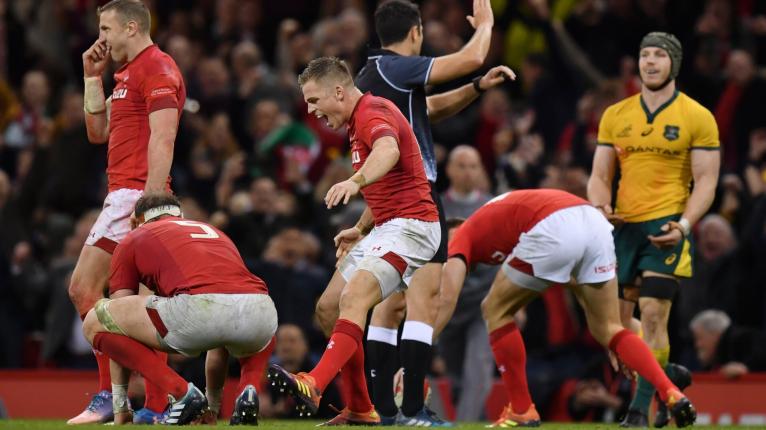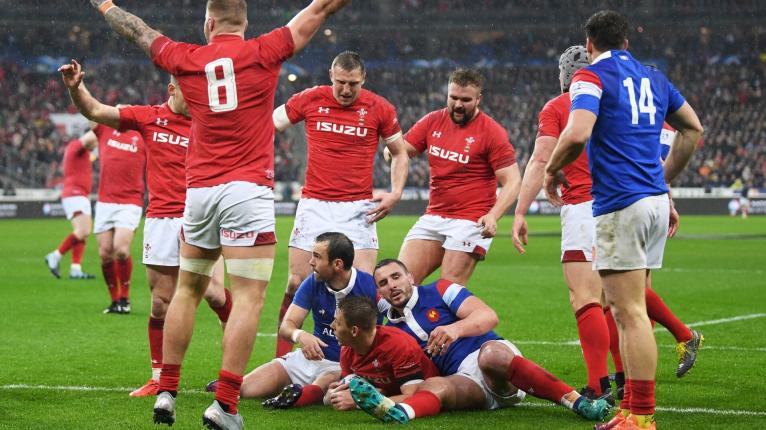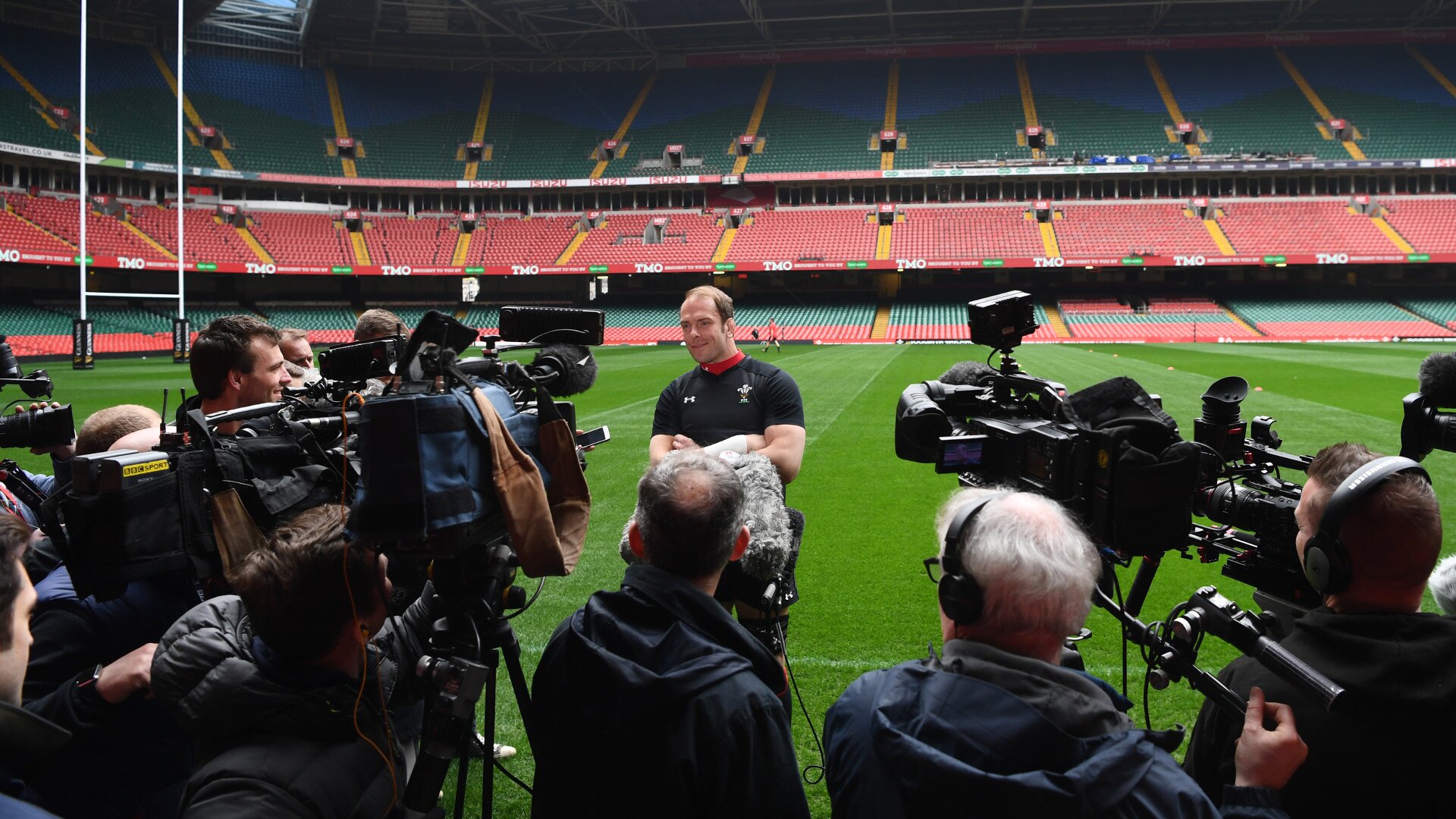Forty-nine players, six debutants, 301 points, 31 tries and 109 years - standing on the edge of history

Today’s the day, the opportunity for Wales to make a lasting statement and statistically become the greatest Welsh side of all-time. On paper at least.
Test rugby has been their country’s greatest passion for 138 years and they have savoured many excellent sides in that time. None greater perhaps than the geniuses of the 1970s when four championship titles were won in five seasons, two of those triumphs going into the books as Grand Slams.
Unbeaten runs stretching into double figures, though, have been rare. Just three times have the Welsh clocked this level of winning consistency. Graham Henry, the so-called great redeemer, managed a 10-match winning streak in 1999 that had its highlight in a Grand Slam-stopping ambush of England at Wembley before they crashed at that year’s World Cup.
Warren Gatland’s current charges have gone one better, making it to 11 a fortnight ago in Rome and matching a feat last achieved more than 100 years ago when Wales embarked on a winning run that started in March 1907 and continued until January 1910.
That slow build was reflective of olden times when Test matches were seldom played, unlike today’s jam-packed international calendar. Getting to 11Ws all over again has taken just 12 months 109 years later and it’s been an eventful journey: 49 different players capped, 10 appearances each for most-used pair Cory Hill and Elliot Dee, six debutants, five separate match-day captains, 301 points scored and 32 tries celebrated.
Not that it has all been sweetness and light. Their bumps on the road have included everything from Ross Moriarty’s red card in Argentina to the jitters that were losing 24-22 early in the second half to Tonga and then being deluged 0-16 at the break in the Paris rain at the start of this month.
The best two reasons for optimism to take from their current buoyancy? Gatland has enthusiastically explored his squad depth with his beady eye set firmly on the September World Cup in Japan. Not only is their newly added depth influencing the mentality of those players brought in, it has enhanced the mentality of those already there and made them harder to beat.
In bolstering this backbone, Wales have also unveiled new-found steel to hang on and find solutions in difficult situations with some better composed rugby.

Defence saved them in last March’s one-point survival versus the French, while they have since demonstrated some late-stage attacking guile, sealing victories in the closing minutes against South Africa (twice), Australia (their first win over the Wallabies in 14 attempts) and France with a composure not previously guaranteed in tight-run things since the last World Cup.
Now, though, comes the coronation for all this foundation. A chance to create history by derailing the English chariot that is two points ahead of them on the Six Nations table due to their bonuses.
Win today – which will also leapfrog them over the English and into third in the world rankings – and Wales’ winning run will start earning genuine kudos. Lose, though, and the past year will be looked upon by rivals as merely a quirk of the fixtures scheduling rather than anything to make the world really sit up and take notice.
.@Jnavidi knows the value of getting in early ⏰ Please arrive in good time tomorrow to make the most of what will be an incredible day in Cardiff's @principalitysta. Diolch! pic.twitter.com/Us6qp8AU1M
— Welsh Rugby Union 🏴 (@WelshRugbyUnion) February 22, 2019
Take the record 18-match winning runs that New Zealand and England recently enjoyed until they were respectively picked off by Ireland in Chicago in November 2016 and in Dublin four months later.
The All Blacks gained rave reviews for their five dismissals of Australia, which included the 2015 World Cup final. There was also a 2016 Rugby Championship title, three wins over South Africa and another three apiece against Argentina and Wales. Impressive.
England, meanwhile, racked up a pair of Six Nations titles in their sequence where they also beat Australia on four occasions, three wins arriving down under.
Collectively, those results got people talking about the winning streak list confined to New Zealand (runs of 18 wins, 17 twice, 16, 15 twice, and 12), England (18 and 14), South Africa (17, 15, 13) and Ireland (12). That is the cusp of what Wales are nearing now – and a big-game win can get them up to 12 and endorse the green-shoots of their progress this last year.

Seeing off England today – and Ireland in the next few weeks – would leave only New Zealand as the sole top tier side not on their casualty list. That would be irrefutable evidence of evolution.
Gatland enthused in Paris how “winning is a habit and we have it at the moment”. It clearly is, particularly when you factor in Wales’ previous best in the Kiwi’s 11-year reign is five Test wins on the bounce on three occasions. But they have now got to keep this trend intact or face jibes from the likes of Eddie Jones who was in his element during this week’s build-up.
“The Dragons are flying”, “We’re playing potentially the greatest team ever”, and “It’s the biggest game they are going to play in their lives” was a flavour of the rose-tinted repartee that came whizzing across the Severn bridge to provoke a reaction.
"#WALvENG doesn't need much bigging up," says @George_North. "This is the one you want to be involved with."
📰 – https://t.co/uh7O25ISDi #GuinnessSixNations pic.twitter.com/0G1siTzu9P
— Welsh Rugby Union 🏴 (@WelshRugbyUnion) February 22, 2019
Wales bit back, turning the focus onto the combustible temperament of Kyle Sinckler, one of five England forwards starting their first Cardiff Test match. Soon, though, all this talking will be over and we will know if this Welsh outfit has sealed its historic 12th win in a row, an accomplishment they have never managed to do despite picking up the ball and running with it as far back as 1881.
WHO’S HAS DONE WHAT IN 11-GAME WINNING STREAK
10 appearances – Cory Hill (6 starts + 4 as sub), Elliot Dee (5+5);
9 – George North (9), Gareth Anscombe (6+3), Nicky Smith (6+3), Rob Evans (4+5);
8 – Hadleigh Parkes (7+1), Ross Moriarty (7+1), Adam Beard (7+1), Gareth Davies (6+2), Tomas Francis (6+2);
7 – Liam Williams (6+1), Owen Watkin (5+2), *Tomos Williams (3+4), Dillon Lewis (3+4)
6 – Josh Adams (6), Justin Tipuric (6), Ken Owens (5+1), Alun Wyn Jones (5+1), Ellis Jenkins (4+2), Dan Biggar (3+3), Aled Davies (2+4);
5 – Jonathan Davies (5), *Aaron Wainright (2+3), Ryan Elias (1+4);
4 – Staff Evans (3+1), Leigh Halfpenny (3+1), Hallam Amos (3+1), Seb Davies (3+1), Rhys Patchell (2+2), Bradley Davies (2+2), Wyn Jones (1+3);
3 – Scott Williams (3), *James Davies (3), Josh Navidi (3), Samson Lee (1+2);
2 – *Jonah Holmes (2), Taulupe Faletau (2), Dan Lydiate (2), Jake Ball (2), Rhodri Jones (+2), Josh Turnbull (+2), Tom Prydie (1+1), Leon Brown (1+1);
1 – *Luke Morgan (1), Tyler Morgan (1), Thomas Young (1), *Jarrod Evans (+1), Aaron Shingler (+1).
*Denotes player newly-capped during run
THE RECORD-EQUALLING RUN
- Beat Italy 38-18 in Cardiff (March 11)
- Beat France 14-13 in Cardiff (March 17)
- Beat South Africa 22-20 in Washington (June 2)
- Beat Argentina 23-10 in San Juan (June 9)
- Beat Argentina 30-12 in Santa Fe (June 16)
- Beat Scotland 21-10 in Cardiff (November 3)
- Beat Australia 9-6 in Cardiff (November 10)
- Beat Tonga 74-24 in Cardiff (November 17)
- Beat South Africa in 20-11 in Cardiff (November 24)
- Beat France 24-19 in Paris (February 1)
- Beat Italy 26-15 in Rome (February 9)











































































